- Home
- Gail Carriger
Defy or Defend Page 4
Defy or Defend Read online
Page 4
Bertie pressed, “So you’ll go as her safety?”
Cris was an adjunct safety. He’d been knighted for his services to the Crown after a particularly horrendous military action. He was not an indenture. The War Office couldn’t order him into anything, they could only request his services. Once he said yes, then they could order him about. He worked for them because he liked to be useful, and he wasn’t sure he was good for anything else. Also, he needed to make things right, make things better. For everyone, he supposed, even vampires. Bertie knew that about him and wouldn’t want him feeling coerced or pressured.
Perhaps that was why his friend was hiding something.
Cris continued his pacing, turning on his heel every six steps, rhythmically, making a satisfying squeak on the marble floor. “Let me understand fully. You want us inside quickly to determine the ramifications of the hive’s situation. Then Sparkles is to tidy up if she can, and I’m to get her out fast if she can’t. Because she’d want to stay and fix everything, if there’s even half a chance of saving them, at risk to her own life.”
“Got it in one, my dear chap.”
“What happens if we fail?”
Bertie looked away, the intensity of his dark, sharp eyes elsewhere, hiding the truth.
Cris pressed. “Bertie, what’s the plan to safeguard our retreat?”
“BUR will send in a sundowner.”
Cris paused, shocked. “For only the queen, or...”
Bertie wouldn’t look at him.
Crispin’s skin prickled all along his hairline. “Kill an entire hive? That’s slaughter!”
Bertie’s smiling mouth turned down. “We can’t let a hive go fully Goth, old chap. The last time that happened, France had a revolution. The white wolf walked and thousands died.”
“How long do Sparkles and I have to save them?”
“Two weeks.”
Cris ran both hands through his short hair, tugging it, using the pain to center himself and to stop the prickling. “You don’t ask for much, do you?”
Bertie stood and faced him, swallowing, chin firm. Bertie his boss at the War Office rather than Bertie his friend. “So, Sir Crispin, I’m formally requesting – will you take the mission?”
A gentleman’s word is his bond. Cris glared at Bertie. “Of course I’ll bally well take it. Someone has to keep an eye on her. Someone has to save the hive. I guess it’s us. Curses, how has BUR let it come to this?”
“They’ve had a lot of werewolf problems recently.”
Cris puffed out his cheeks, then let the air out in a huff and began to pace again. It occurred to him that he’d been short with one of his oldest friends. A man who’d put up with him since university. Bertie, who had never minded where Cris came from, how awful his father was, even when other families instructed their sons not to associate with “that Bontwee boy.” Bertie, who’d seen him through bumbling awkwardness and broken hearts. Who’d stuck by him for years now.
“I’m sorry, old chap, I didn’t mean to be curt with you.” He sighed and ran his hands through his hair again. “Honestly, Bertie, how am I supposed to pretend to be an artist? I’m neither an intelligencer nor an actor.”
He gestured at himself.
There was no doubt about it, he was a sporting fellow – big boned and far too tan, and there were some who called him rangy. Rather unkind, that. It wasn’t as if he played golf. Still, pale, wispy artistic type he most definitely was not. Not that all artists leaned that way, as a rule, it was simply that he didn’t even begin to look the part, and in espionage it was best to activate expectations, erroneous or not.
Bertie sighed. “We will give you clothing with paint splotches on it. Try to slouch a bit. Let your hair grow.” He squinted at Cris, as though seeing him fuzzy might improve him into an artistic inclination.
Cris crossed muscled arms over a wide chest and tilted his head at his friend.
Bertie winced. “Perhaps you’re the kind of artist who does things with large sheets of metal? You know, whelping or winching, something brawny and modern like that? Or stone maybe? Great slabs of granite? We could sprinkle marble dust in your hair? You should grow a beard.”
“I am not growing a beard, Bertie. Not even for my country.”
“You do have a very manly jaw. Pity to cover it over.”
“Thank you, old chap.”
“How about mutton chops? Or a mustache? That’d serve double duty – save you from Lord Akeldama’s interest. He’s reputed to have a horror of mutton chops and mustaches.”
Cris ignored this and pushed the conversation back to the mission. “And when the vampires ask me to actually create something arty?”
Bertie flicked the fingers of his free hand. “Just spend the entire visit claiming you’re in the throes of a tragic creative dearth. Lament your sad state. Artists do that sort of thing, don’t they? Regularly? It’s like writer’s block, only with paint.”
Cris wrinkled his nose. “I suppose so. I don’t fraternize with many artists.”
“Wear ill-fitting clothes. And tilt your hat forwards all the time.”
“Sometimes I hate the images you put in my head, Bertie.”
“The Honey Bee will carry you.”
“I’m not overly fond of that image either.”
Bertie grinned at him.
Cris sighed, wondering how many oversized shirts he had in his wardrobe and what his valet was going to say about it all.
“When do we leave?”
“Tomorrow afternoon, by dirigible.”
“Oh, I say! Not floating.” Cris was not a very good floater – it played hell with his tummy.
“Floating.”
“Blooming heck.”
“Oh, and Crispy, you’re also supposed to pretend to be married to her.”
“Oh, Bertie, I say. That’s not on!”
“Wedded bliss, Crispy. Your chance to try it out.”
“I hate you sometimes, Bertie.” Cris said it with love, of course.
“Have fun, old chap.”
Cris paused at the doors to the conservatory. “I do have one artistic inclination... but if you tell anyone outside of the bounds of this operation, Bertie, so help me God!”
Bertie raised one hand. “I swear it.”
So Cris told his oldest friend his second greatest secret.
Dimity bounced only a little when she saw who was waiting for her on the embarkation green. But she did most assuredly bounce – honestly, she couldn’t help it. Sir Crispin was her safety for this mission! Someone was on her side at last! Probably Bertie.
She sent her boss at the War Office a fervent prayer of gratitude. Thank you, Albert Luckinbill. May your cacti be fruitful and multiply.
Dimity’s truest friend in the whole wide world was a bit of a climber. Not socially – actual physical climbing, like up mountainsides. Turn your back on Sophronia for one minute and she was inching over the side of a dirigible or getting up on top of a moving train. But Dimity wasn’t that kind of intelligencer. Oh, she could climb if she must, but it wasn’t her strong suit. Nevertheless, as certain as fire opals were her favorite jewel (and they absolutely were, so colorful!) Dimity Plumleigh-Teignmott wanted to climb Sir Crispin Bontwee.
Firstly, let us be clear, he was a physically pleasing specimen of manhood. Extremely well-proportioned, with excellent musculature, a well-turned leg, and the kind of cheekbones that once would have driven Dimity into fits of poetry. Dimity no longer wrote poetry, for which the world was no doubt grateful. But those cheekbones. Sir Crispin also had nice straight teeth, or she believed he did. He rarely smiled, so it was difficult to know for certain. His mouth was generous and looked like it wanted to smile often – only for some reason he felt the need to keep very good control over it.
Dimity really wanted to make him smile, and tried, a lot. And failed. A lot.
Which happened to be the most attractive thing about Sir Crispin – his e
xcellent control. For example, the man was always moving, always in motion, yet not nervous about it, simply energized. It was as though he was leashed and held tight by his own discipline, like some jungle cat ready to pounce. And Dimity wanted desperately to be the recipient of a good pouncing.
Oh dear, there she went, waxing poetic. That kind of wax would never do.
It was only that Dimity had never wanted a man to pounce on her before, but she wanted it from Sir Crispin. Had done for simply ages. Yet he resisted all her wiles, most valiantly.
Lastly, Sir Crispin numbered the fact that he was a tuppenny knight. Not too high status, not too obscure, but perfectly balanced on the cusp of the nobility. Which meant he was brave and handsome, and ranked exactly as Dimity always wished. Hadn’t she said, well over a decade ago now, to that selfsame truest friend in the whole world, that all she really wanted was to one day marry a tuppenny knight?
And here he was.
Dimity always liked to be a woman of her word. She wanted Sir Crispin settled, preferably in her bed, in her house, in her life. Hers.
And now, well now, they were about to be sequestered, together, for a fortnight, in a vampire hive. Fantastic!
To her profound delight, when he handed over her papers and her identity, Sir Crispin also handed over a wedding ring... they were to be sham married as well!
Dimity couldn’t help it. She grinned at him. “Well, good evening, husband.”
Sir Crispin heaved a great sigh. “Sparkles.”
“This ring is not to my taste.” It was a sad, plain little thing, no real splash to it.
“Next time I’ll insist Bertie provide a much bigger, more elaborate statement. But we are meant to be poor starving artists, remember?”
“How can I distract someone by fiddling with it, when it boasts barely a single paste diamond?”
“What, those earrings aren’t bold enough?” He flicked one gently, teasing.
Dimity was wearing a pair of amethyst, diamond, and silver chandelier earrings, huge and dangly and utterly fake. As a poor artist, she didn’t mind that they looked it a bit too. Except the silver, of course. That was real. The design of each dangle ended in a nice sharp point that could cut flesh if applied properly and with enough force. One should always keep silver around in these days of werewolves.
Dimity swung her head so that they shimmered in the afternoon light. Sir Crispin pretended to shield his eyes in mockery of their brilliance. But his own eyes were shining at her with amusement. Oh, she did so very much like the man.
She glanced over her paperwork while they stood in the queue to board. “Mr and Mrs Christopher Carefull. Charming.”
“No, Carefull.”
She bumped him, happy for his teasing. “And I’m Jonquil again. Only this time the artist identity, and married now. I do like that persona. Well, Mr Carefull, shall we?”
Sir Crispin rolled his eyes. “I’m calling you Mrs Carefull. Or Sparkles, of course.” He bent to scratch the ears of someone’s pampered pup. The dog lolled a tongue at him, and Cris told him in very warm tones how good he was. Dimity thought Sir Crispin was awfully good too.
“And I shall call you husband. It suits you so well.” She fluttered her lashes down at him suggestively. Trying to hide how much she genuinely did like the moniker.
The queue moved forwards and Sir Crispin stood to show their chits to the float conductor, who waved them aboard.
Dimity trotted ahead and up the gangplank, twirling her parasol and waggling her hips to make her cage crinoline sway as much as possible. “Come along... husband.”
He groaned and strode after her. Catching up easily and poking her with his arm. Which she then grasped as if he had offered it quite gallantly.
She gave him a coy glance. “Such a gentleman I’ve married.”
“You’re not going to let this slide, are you?” He was so careful with her, always, even when teasing. Almost shy about it. Dimity had always felt, from the very beginning, that there was something odd about Sir Crispin. She had realized eventually, almost too late, the fact that he was a genuinely good man. And there were so few of those about. She’d almost missed it. Almost missed him.
“You could call me wife, you know.” She wanted to hear it in his voice.
He remained stoic. Such a difficult man. “This way, Mrs Carefull.”
“Don’t mind if I do, husband.”
“Carefull of the step up on to the deck.” He was almost smiling. His expression fell, however, the moment they boarded.
The float up to Nottingham was likely to take the better part of the afternoon. And it turned out that poor Sir Crispin wasn’t a very good floater. Dimity intended to make the most of it. Take every advantage, her teachers used to say. Dimity most certainly would. She would dab his brow and wave the smelling salts and boil water and all manner of wifely caring things that she could think of.
They had a private dining berth, mostly because they needed to discuss tactics. Otherwise the War Office would never have countenanced the expense. Dimity was grateful. She had a considerable amount of baggage to keep track of and would rather it stayed with them. Plus, it was a great deal easier not to talk in code. And how could she be demonstrably wifely and kind if she had to be on her guard around strangers?
The airship smelled of coal smoke and orange blossoms. It was not unpleasant. And they enjoyed an easy launch and puff up, despite Sir Crispin’s clutching the berth cushions like some maiden aunt on her first air venture.
Much to Dimity’s disappointment, he didn’t seem to get very airsick. Not that she wanted him sick, but she simply didn’t often get the chance to be a ministering angel. It seemed more that he was afraid of heights, which frankly, Dimity couldn’t do much about except try to distract him with chatter or irritation or both. Also wifely, but not in the way she really wanted to prove she could be. Not worthy. Just her normal manipulative self.
After bringing them tea, the onboard footman left them to their own devices. Dimity stared out wistfully at the puffy clouds and the countryside below, chattering away about how frustrating the inventor had been on her last mission. This seemed to work well enough, as Sir Crispin became increasingly irritated by her descriptions of her attempted seduction (she could understand, she’d been frustrated herself) and eventually distracted himself from their great height by securing the berth for maximum privacy.
England was a patchwork of green below them. Dimity sighed in pleasure and poured the tea. She did miss floating. Such a civilized way to travel.
Sir Crispin, on the other hand, was finally looking slightly green. Assured that they could not be overheard, and that Dimity did not want the window sash up, he sat down with a groan.
“Why must we bob about in such a vulgar manner?” he grumbled.
Dimity smiled at him, wishing she had dimples. Surely even Sir Crispin couldn’t resist a dimple. “My fault, I’m afraid. I insisted. I can’t abide trains. I had a nasty experience crashing one as a girl. Are you well? Should I ask the steward for a cold cloth to lay upon your brow?”
“No thank you. It’s my normal process when floating. Abject infantile terror, illness, and then resignation. I shouldn’t like to inconvenience the steward.” He seemed more disgusted with himself than the situation warranted.
“My dear sir, not everyone can be a good floater. And I assure you I, not the steward, would dab your forehead in a wifely and winsome manner.”
“I’m sure you would be very winsome about it, but I don’t want to put you out, either. I assure you I’ll be fine. Resignation will happen soon enough.”
“Pity.” Dimity glanced down at the dossier they’d been given. Mostly in cipher, of course, although nothing too sophisticated. It was only the government, after all. Dimity decided that she’d demand a tour of the dirigible’s boiler room before they depuffed, and dispose of them safely then. First she’d memorize what was needed, of course, and prove her acumen to Sir Cris
pin.
“What concerns me,” said Dimity, into the only slightly awkward silence of their both reading about vampires, “is the condition of this supposed cave the queen has sequestered herself in. I mean to say, what kind of cave is it? Is there hot and cold running water? Air ventilation? Heating? Not that vampires care much for heating, but you must see my point? There’s a matter of serious concern when a cave is in play.”
“It is Nottingham. There’s basic plumbing in any given cave of any respectability.”
“Oh, a respectable cave, is it? Where does it say that?” Dimity blinked at him (unintentionally, for a change). “Unless... Is Nottingham very much known for its respectable caves, then?”
“Most assuredly. Whole ruddy town is riddled with them. Most grand houses boast a cellar of some kind carved into the limestone. There’s a vast network of interconnected underground pathways and such. All built by vampires and their minions, of course, during the Dark Ages. They were forced underground, you see? Werewolves took to Sherwood Forest, started robbing noblemen, inventing ridiculous nicknames for themselves, and gallivanting about in overly tight hosiery. But the vampires, they went underground.”
“Gracious,” said Dimity, “I’d no idea. I mean to say, I’d heard about the Sherwood werewolves, of course – who hasn’t? Didn’t they wear hoods with feathers in, or some such rot? – but not the vampires.”
“Isn’t that often the case?”
Dimity nodded. One was tempted to think of vampires as more flashy than werewolves, but the werewolves were usually more bold – an interesting dichotomy. She evaluated Sir Crispin from under her lashes. He’d make a good werewolf. That wide chest and deep, gentle voice. She tried not to hum in appreciation.
She pulled herself away from manly chests and the idea of Sir Crispin in tight hosiery gallivanting through forests (because that was near to restarting her inclination for verse). “So a city of caves and, we hope, plumbing. Now, do we have a tactic for me to deploy within the hive? Seduction? Is it a matter of redecoration? Or am I to focus on matchmaking and relationship management?”
“Possibly all three.” Sir Crispin looked none too pleased by this idea.

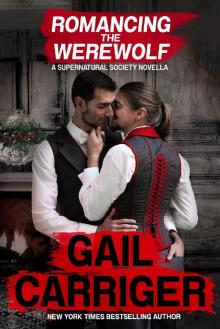 Romancing the Werewolf
Romancing the Werewolf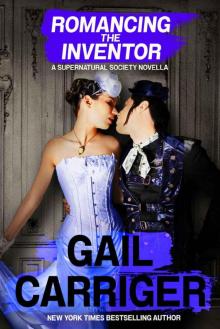 Romancing the Inventor
Romancing the Inventor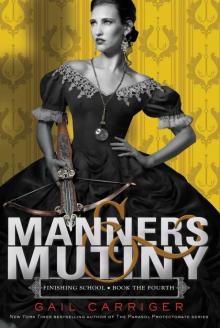 Manners & Mutiny
Manners & Mutiny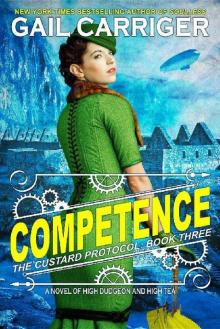 Competence
Competence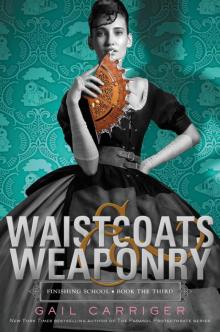 Waistcoats & Weaponry
Waistcoats & Weaponry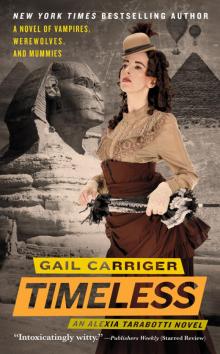 Changeless
Changeless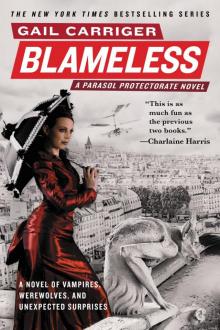 Blameless
Blameless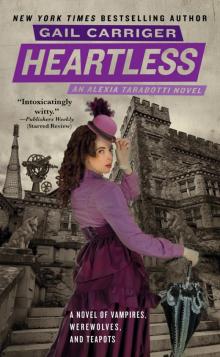 Soulless
Soulless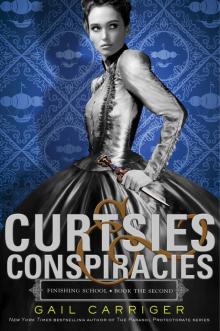 Curtsies & Conspiracies
Curtsies & Conspiracies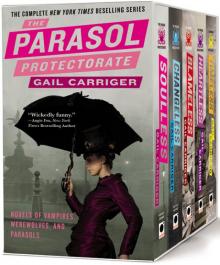 The Parasol Protectorate Boxed Set
The Parasol Protectorate Boxed Set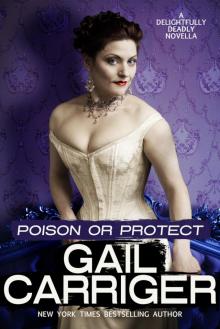 D2D_Poison or Protect
D2D_Poison or Protect Funny Fantasy
Funny Fantasy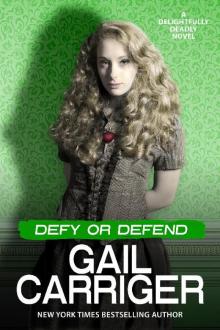 Defy or Defend
Defy or Defend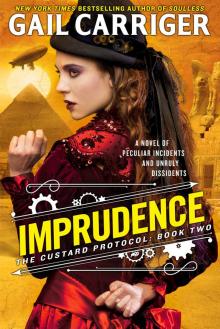 Imprudence
Imprudence Reticence
Reticence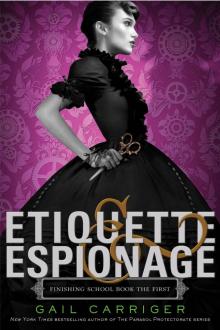 Etiquette & Espionage
Etiquette & Espionage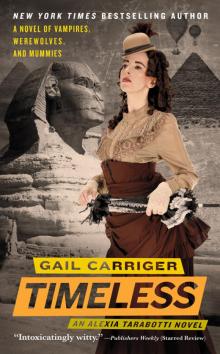 Heartless
Heartless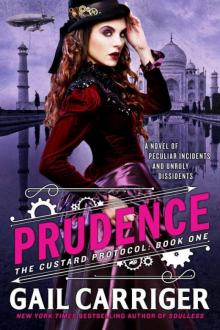 Prudence
Prudence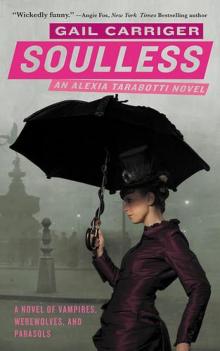 Parasol Protectorate 01 - Soulless
Parasol Protectorate 01 - Soulless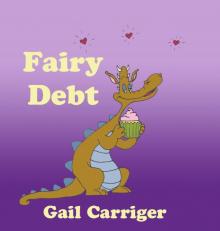 Fairy Debt
Fairy Debt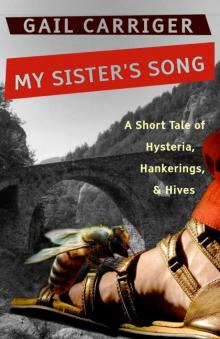 My Sister's Song
My Sister's Song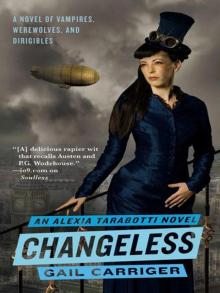 Changeless: The Parasol Protectorate: Book the Second
Changeless: The Parasol Protectorate: Book the Second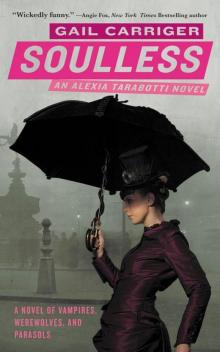 Soulless: The Parasol Protectorate: Book the First
Soulless: The Parasol Protectorate: Book the First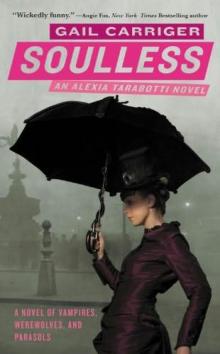 Soulless pp-1
Soulless pp-1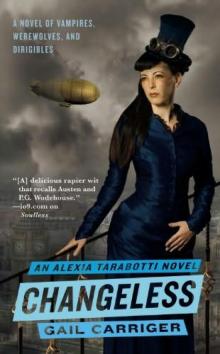 Changeless pp-2
Changeless pp-2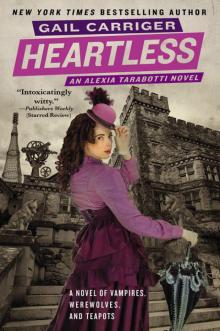 Heartless: The Parasol Protectorate: Book the Fourth
Heartless: The Parasol Protectorate: Book the Fourth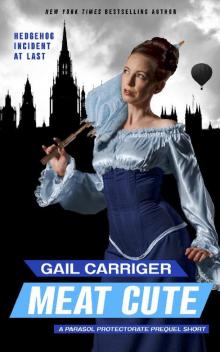 Meat Cute
Meat Cute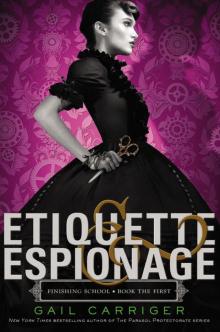 Etiquette & Espionage (Finishing School)
Etiquette & Espionage (Finishing School)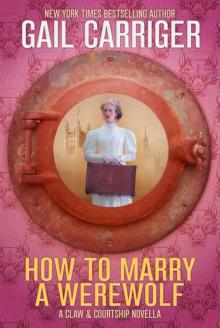 How To Marry A Werewolf (Claw & Courtship Novella Book 1)
How To Marry A Werewolf (Claw & Courtship Novella Book 1)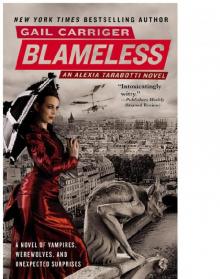 Blameless: The Parasol Protectorate: Book the Third
Blameless: The Parasol Protectorate: Book the Third Heartless pp-4
Heartless pp-4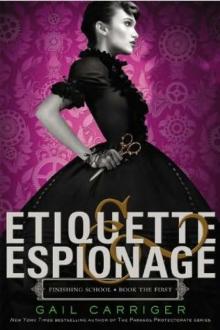 Etiquette & Espionage fs-1
Etiquette & Espionage fs-1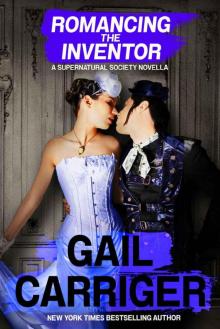 Romancing the Inventor: A Supernatural Society Novella
Romancing the Inventor: A Supernatural Society Novella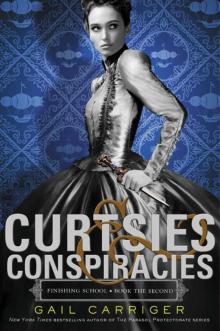 Curtsies & Conspiracies fs-2
Curtsies & Conspiracies fs-2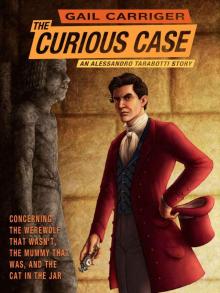 The Curious Case of the Werewolf That Wasn't, the Mummy That Was, and the Cat in the Jar (The Parasol Protectorate Book 6)
The Curious Case of the Werewolf That Wasn't, the Mummy That Was, and the Cat in the Jar (The Parasol Protectorate Book 6)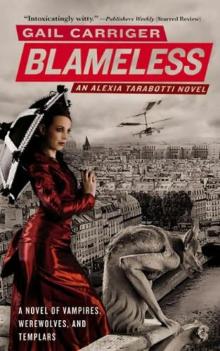 Blameless pp-3
Blameless pp-3